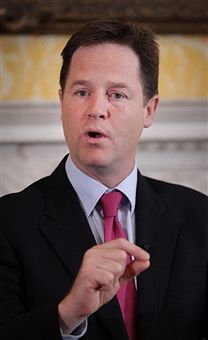 Oddly, David Cameron’s most voluble supporter throughout the phone-hacking psychodrama has been Nick Clegg. The deputy prime minister
took to the airwaves when no Tory dared or wanted to. Earlier today, Clegg gave a speech-cum-press conference and he defended the prime minister again, saying that he had very little to add to
Cameron’s statement yesterday. He also defended Cameron over unanswered questions about Rupert Murdoch’s purchase of BskyB; Clegg said that Cameron had “nothing to do” with
the deal, although he added that Vince Cable’s reservations had been vindicated.
Oddly, David Cameron’s most voluble supporter throughout the phone-hacking psychodrama has been Nick Clegg. The deputy prime minister
took to the airwaves when no Tory dared or wanted to. Earlier today, Clegg gave a speech-cum-press conference and he defended the prime minister again, saying that he had very little to add to
Cameron’s statement yesterday. He also defended Cameron over unanswered questions about Rupert Murdoch’s purchase of BskyB; Clegg said that Cameron had “nothing to do” with
the deal, although he added that Vince Cable’s reservations had been vindicated.
Clegg then elaborated on media regulation. Unsurprisingly, he insisted that the status quo must change. It was ludicrous, he said, that the Press Complaints Commission’s code of coduct is judged by editors and chaired by Paul Dacre. There must be more transparency and accountability, he said, repeating again the mantra of this government. Interestingly, he also said that regulation cannot be static: “the plurality test should be continuous.”
There were a few questions about the business of public service reform. Faced with the news that the police force will be 34,000 officers lighter by 2015, Clegg was stoic. “There is more scope,” he said for the police to become more efficient without cutting jobs, sticking exactly to the line taken by Theresa May.
Finally, Clegg talked about the Eurozone crisis. Two weeks ago, Clegg urged Britain not to be beastly to the Eurozone. Naturally, as a europhile, his tone differed from that of Conservative ministers; but Clegg’s rhetoric now seems to have hardened. He warned that this was “not an opportunity for us to dislocate” nor was this a time for a “parting of ways”. The meaning of the second statement is pretty clear, but what does ‘dislocate’ mean? There has been much discussion about Britain extracting concession from Brussels in return for its agreement under forthcoming treaty changes. Might that qualify as dislocation? Perhaps, but as Britain is currently resisting attempts to introduce pan-European banking regulation it seems rather academic to be taking about repatriating sovereignty.






Comments